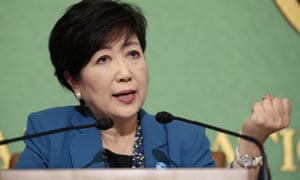
Japan’s prime minister, Shinzō Abe, faces a serious challenge from an ally turned nemesis, as voters prepare to go to the polls next month in an election he has described as a verdict on his handling of the economy and North Korea.
Abe dissolved the lower house of parliament on Thursday, with polls showing a new conservative party formed by the popular governor of Tokyo, Yuriko Koike, making ground on his ruling Liberal Democratic party (LDP).
Koike’s Party of Hope, formed only a day earlier, has pledged to be a “tolerant, conservative reform party” that will challenge vested interests and respect diversity.
Koike, a former news anchor who speaks English and Arabic, has cast herself as a conservative populist, determined to take on the political old guard, since she became Tokyo’s first female governor last year.
“If at this time we don’t reset Japan, we won’t be able to sufficiently protect our international competitiveness and national security,” Koike said at her party’s official launch.
Abe called the election – a year earlier than expected – in an attempt to exploit a weak and divided opposition and to secure a mandate for his spending plans and tough line against Pyongyang’s missile and nuclear programmes.
Koike, who served as defence minister during Abe’s first term as prime minister a decade ago, has said she will not run in the election but will stay on as governor to oversee preparations for the 2020 Tokyo Olympics.
But her decision to lead the new party, coupled with her positive media profile, could frustrate Abe’s plans by attracting conservative and undecided voters.
Opinion polls showed the Party of Hope closing the gap on the ruling party, despite signs that Abe has emerged relatively unscathed from two summer scandals that dragged his support to the lowest levels since he became prime minister in late 2012.
A survey by the Mainichi newspaper found 18% of respondents would vote for Hope compared with 29% for Abe’s party. Another poll by the Asahi newspaper put Koike’s party on 13% and the LDP on 32%.
The Party of Hope’s emergence on the national political scene has thrown the main opposition party, the Democrats, into turmoil. Several Democrat MPs have defected to Koike’s party, while its leader, Seiji Maehara, is reportedly considering allowing Democrats to run as Hope candidates.

While the LDP is expected to win, a strong challenge from the centre-right could cost it precious seats in the powerful lower house.
The LDP and its junior coalition partner, Komeito, have the two-thirds majority in both houses Abe needs to push ahead with his plans to rewrite Japan’s pacifist constitution.
Failure to retain his party’s supermajority would in effect end the prospects for constitutional reform – a project to which Abe has devoted his entire political career.
Yoel Sano, head of global political and security risk at BMI Research in Tokyo, said Abe’s gamble could backfire if voters see the snap election as a grab for power.
“The Japanese public may view it as a cynical and opportunistic move, especially given the severity of the North Korean crisis,” Sano said.
Koike, who has long been tipped to become Japan’s first female prime minister, defied the LDP to successfully run for the Tokyo governorship last year. In July, the local forerunner to her party crushed the LDP in the Tokyo assembly elections, fuelling speculation that she would challenge the ruling party in national elections.
“Unlike in Britain with Labour, there is no opposition worthy of the name in Japan,” said Jeff Kingston, director of Asian studies at Temple University in Tokyo. “The LDP is a giant among dwarves. It would take a major scandal to derail the Abe express.Some analysts said Abe was unlikely to suffer the same fate as the British prime minister, Theresa May, who called a snap election in the spring only to see her Conservative party lose its majority in the House of Commons.
“He may not retain his supermajority but given the fractured and unprepared state of Japan’s opposition parties, it’s hard to see much risk to a commanding majority.”
Abe and Koike are both business-friendly conservatives and hawkish on security, but they differ in two areas that could have a bearing on the election.
While Abe is committed to a sales tax rise in 2019 he says is needed to fund spending on education and nursing care for the elderly, Koike has called for a freeze on the tax.
Koike has also called for Japan to abandon nuclear power after the 2011 Fukushima meltdown; Abe supports reactor restarts.
“There’s not much daylight between Koike’s party and the LDP,” said Gerry Curtis, professor emeritus at Columbia University. “It’s a question of who can impress the voters as more competent. It’s competence and it’s character.”

No comments:
Post a Comment